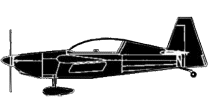
ASN Wikibase Occurrence # 294999
This information is added by users of ASN. Neither ASN nor the Flight Safety Foundation are responsible for the completeness or correctness of this information.
If you feel this information is incomplete or incorrect, you can submit corrected information.
| Date: | Tuesday 11 November 2003 |
| Time: | 12:20 LT |
| Type: |  Zivko Edge 540T |
| Owner/operator: | Private |
| Registration: | N540RC |
| MSN: | 2014 |
| Total airframe hrs: | 100 hours |
| Engine model: | Lycon AEI0-540-EXP |
| Fatalities: | Fatalities: 0 / Occupants: 2 |
| Aircraft damage: | Substantial |
| Category: | Accident |
| Location: | King City, California -
 United States of America United States of America
|
| Phase: | Unknown |
| Nature: | Training |
| Departure airport: | Mesa Del Rey Airport, CA (KIC/KKIC) |
| Mesa Del Rey Airport, CA (KIC/KKIC) | |
| Investigating agency: | NTSB |
| Confidence Rating: |
The airplane lost engine power and subsequently overran the runway and impacted terrain while making an emergency landing at an airport. The pilot reported that about 5 minutes after takeoff he noticed a loss of oil pressure, followed by a loss of power. He decided to return to the departure airport, and while en route back the windscreen became obscured by engine oil. During the landing the pilot landed long and was unable to stop the airplane before it departed the runway environment. The airplane came to rest north of the departure end of runway 29 in a ditch. During the engine examination, the crankshaft was found cracked completely through diagonally across the counterweight hanging blade cheek located between connecting rod journal numbers five and six. Textron Lycoming was contacted regarding the crankshaft serial number and applicability to the Lycoming mandatory service bulletins (552 and 553) and FAA airworthiness directive (AD2002-19-03) relating to crankshaft manufacturing defects causing catastrophic in-service crankshaft failures. They said the crankshaft by serial number was a "small journal six" and therefore was not affected by the recall or inspections required by both the service bulletins or airworthiness directive. Lycoming service bulletins 552, 553, and airworthiness directive 2002-19-03 relate specifically to engines rated at 300 horsepower (hp) and above. The "small journal six" crankshaft is not a 300 hp crankshaft. It is typically utilized in engines producing no more than 260 hp. Textron Lycoming originally manufactured this crankshaft for installation into an AEIO-540-D4A5 model engine rated at 260 hp and 2,700 rpm. Therefore, neither the mandatory service bulletin nor the airworthiness directive were applicable. This engine was modified by a engine overhaul shop for installation in experimental airplanes and carried a data plate naming the shop as the manufacturer and labeling the engine as a AEIO-540-EXP. The engine closely resembles a Lycoming AEIO-540-L1B5 model rated at 300 hp and 2,700 rpm, but with other modifications proprietary to the overhaul shop that increased its horsepower rating to 340 hp.
Probable Cause: The after market manufacturer's improper application of a crankshaft , which exceeded the original manufacturer's intended use. A factor in the accident was the oil covering the windscreen, which restricted the pilot's ability to see.
Accident investigation:
 |
|
Sources:
NTSB LAX04LA039
Revision history:
| Date/time | Contributor | Updates |
|---|---|---|
| 12-Oct-2022 16:45 | ASN Update Bot | Added |
Corrections or additions? ... Edit this accident description
The Aviation Safety Network is an exclusive service provided by:


 ©2024 Flight Safety Foundation
©2024 Flight Safety Foundation